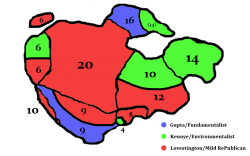2018 United States of Quentin Presidential Election
| 2018 Quentinian Presidential Election | ||
|---|---|---|
| ||
| Turnout: 73.8% | ||
| 130 Electoral Votes, Candidate with Most Electoral Votes Wins | ||
| <-- 2014 ・ 2022 --> | ||
| Candidates | ||
| Mild RePublican Party | ||
| Nominee | Kyle Lovestington | |
| Home State | Desert Area | |
| Running Mate | Steve Shamji | |
| Electoral Vote | 71 (55%) | |
| Popular Vote | 228,956,790 (50%) | |
| Environmentalist Party | ||
| Nominee | Thomas Kenoye | |
| Home State | Grassland Area | |
| Running Mate | Mason Pete-Cox | |
| Electoral Vote | 34 (26%) | |
| Popular Vote | 115,658,920 (25%) | |
| Fundamentalist Party | ||
| Nominee | Shubham Gupta | |
| Home State | Multi-Logan State | |
| Running Mate | Alexa Holcomb | |
| Electoral Vote | 25 (19%) | |
| Popular Vote | 92,502,228 (20%) | |
| Election | ||

| ||
| Other Candidates | Johnaha Baelsar (FRL) Gary Portnopt (GLB) Jeremy Bigsley Jr. (RCP) | |
| Previous President | Kyle Lovestington | |
| Elected President | Kyle Lovestington | |
The 2018 presidential election process began in 2016, with President Lovestington announcing his intention late that year to run for a third term after candidates declared themselves across all three parties that same year. The Mild RePublican nomination was contested more than Lovestington's second campaign, however it ended on March 15th, 2017 with the Mild RePublican primaries confirming Lovestington as the party's nomination for the third straight election. Lovestington's main rival, Governor Rajesh Muduganti, won only 25% of the primary vote. The Fundamentalist primaries were much more contested, with Bureaucrat Gupta barely defeating challengers including Kristie Biller and Tim Follingworth, though Follingworth dropped out of the race before its completion due to Gupta's lead. Finally, the Environmentalist primaries were also held on March 15th, and saw Governor Kenoye victorious over a diverse field of candidates including Dean Thomas and Xavier Ravenson. The conventions of the respective parties, held in May, finalized and made official the results of the primary elections.
Campaigning and major issues contested in the 2018 election were broad, with focus on the recent ratification of the 24th Constitutional amendment, which reinstated the death penalty, the stance of the country on the independence of Rullabellon and the overall interventionism of the country, as well as financial issues including overall taxes, drug and substance taxes, and military spending. The personal history of candidate Shubham Gupta was heavily discussed and debated, with many reports of Gupta's aggressive and temperamental leadership in the House of Bureaucrats surfacing and being capitalized on by his two opponents, though mainly by Governor Kenoye. Numerous analysts agreed Lovestington's neutrality and avoidance of Gupta's past issues during the debates as a partial factor in his victory, as each debate increased Lovestington's poll ratings greatly. Additional topics of contention included infrastructure and energy debates, with Kenoye promoting vast and fast reforms in both sectors, while Lovestington supported a more moderate approach. Gupta largely ran on a platform of inter-party cooperation, which was widely unsuccessful in execution but was adopted by Alexa Holcomb in the 2022 election to greater effect.
On election day, December 7th, 2017, incumbent Lovestington was able to win a substantial victory over the other two candidates, with Governor Kenoye finishing second, and Gupta third. Candidates from the Freelance, Globalist, and Reciprocal parties each won millions of votes as well, notably Reciprocal Party candidate Jeremy Bigsley Jr., who garnered nearly 23 million votes, though none of the three outlying parties won electoral votes. Lovestington secured his victory by garnering the most votes in the PEC, winning with 55% of PEC votes, that number being 71. Kenoye and Gupta gained only 34 and 25 votes, respectively, by comparison. The 2018 election saw Lovestington retain the Desert Area for a third straight year, however by a much closer margin than previously. Long Beach Island and the lower portion of the Grassland Area were both expected but crucial wins for the incumbent President, though the Mild RePublican victory in the upper portion of the Chip Area was a surprise for most analysts. Turnout was on the lower side, though still high, at 73.8%.
The 2018 election is seen as most impactful in continuing to develop what is now referred to as the Green Dip, a crucial and still-developing area including LBI, the northern sections of the DA and KUA, northern GA and Snowland which strongly supports the Environmentalists. The section was not fully developed in 2018, however closer margins were seen in all sections of the Dip. Overall the election maintained the status quo for the third straight year, part of a pattern of overall Mild RePublican dominance not broken until the 2022 election.
